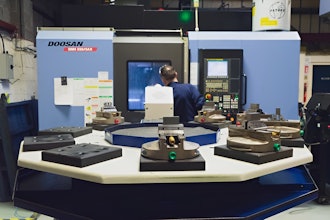
 Cameron Ackbury
Cameron AckburyThis year looks to be a strong one for small businesses. Among nearly 16,000 firms with less than 500 employees, 61 percent expect higher revenues in 2017, according to a national survey published in April 2017 by the 12 Federal Reserve Banks. Of course a strong economy is a good thing. But for small and midsize businesses not prepared for growth, a strong economy can expose gaps in a company’s accounting or operational processes that could lead to problems like revenue leakage. Lost revenue is not something that small businesses, or any business, can afford to ignore. For example, an organization making $50M in revenue can experience leakage of up to five percent, or almost $2.5M in preventable losses.
Small and midsize businesses need to keep a close eye on revenue leakage as they prepare for a strong year. The use of an enterprise resource planning (ERP) system can plug many of the holes within small businesses that currently rely on spreadsheets or manual forms to manage invoicing, pricing and expenses. There are five common contributors to revenue leakage that ERP systems can help to flag or eliminate.
Incorrect data entries. It’s not uncommon for manual errors to creep into invoices created using spreadsheet software, for example, a $100 product is entered as costing $10. If the order is for 50 products, and the error is missed, that represents a $4,500 loss in revenue. ERP systems eliminate this type of error as the correct cost information flows from the sales order to the invoice generated.
Unsent invoices. Sometimes busy companies forget to create and send an invoice. And let’s face it, if a client doesn’t receive an invoice, most likely he is not going to raise a hand to say, “I want to pay you.” The ERP system not only generates invoices, which are date and time-stamped, it also reports on the status of invoices sent.
Unclear payment timeframes. An invoice manually created using spreadsheet may have the right due date for payment. However, separate spreadsheets track the due date and payment status of invoices. Missing or incorrect information may result in the business failing to follow up on collecting past-due payments. By contrast, businesses can use an ERP system to run reports on invoices, due dates, and payments received to trigger appropriate courses of action.
Unmonitored profitability. Topline revenues may be increasing, but the bottom line can be hit by any number of factors. Perhaps the cost of a component within a product has risen. Or despite overall business growth, particular products aren’t selling well. Or the cost of providing a service is higher than anticipated. ERP systems can generate reports about costs versus revenues to help business executives decide whether to reprice or retire offerings that are losing money.
Unchecked generous discounts. Discounts and rebates can be powerful tools for getting customers to buy upgraded product packages, make high-volume purchases, or auto-subscribe to services on a monthly basis. However, eager managers or sales reps risk making these incentives so generous that they cut too deeply into the business’ profit margin to be profitable. An ERP system provides an analysis of sales, including any discounts or rebates, versus costs to help business owners and executives come up with policies for offering incentives. Equally important, the system can then be used to enforce those policies, for example, only allowing a discount of up to 15 percent.
In the past, many small businesses found the cost, time and effort to implement ERP software too daunting. However, a newer generation of cloud-based, or software as a service (SaaS), ERP solutions has significantly lowered the time and effort to get up and running while providing affordable, monthly subscriptions. As a result, companies that move from spreadsheets and manual entry to a SaaS ERP solution to stem their revenue leakage realize benefits within months rather than years.
Now, more than ever, the solutions are within reach for small businesses to ensure that growing revenues translate into higher profits.
Cameron Ackbury is the U.S. president of Deskera.





















